Understanding the 5 Pillars of Mental Health: Expert Insights
Understanding the 5 Pillars of Mental Health: Expert Insights
I Introduction
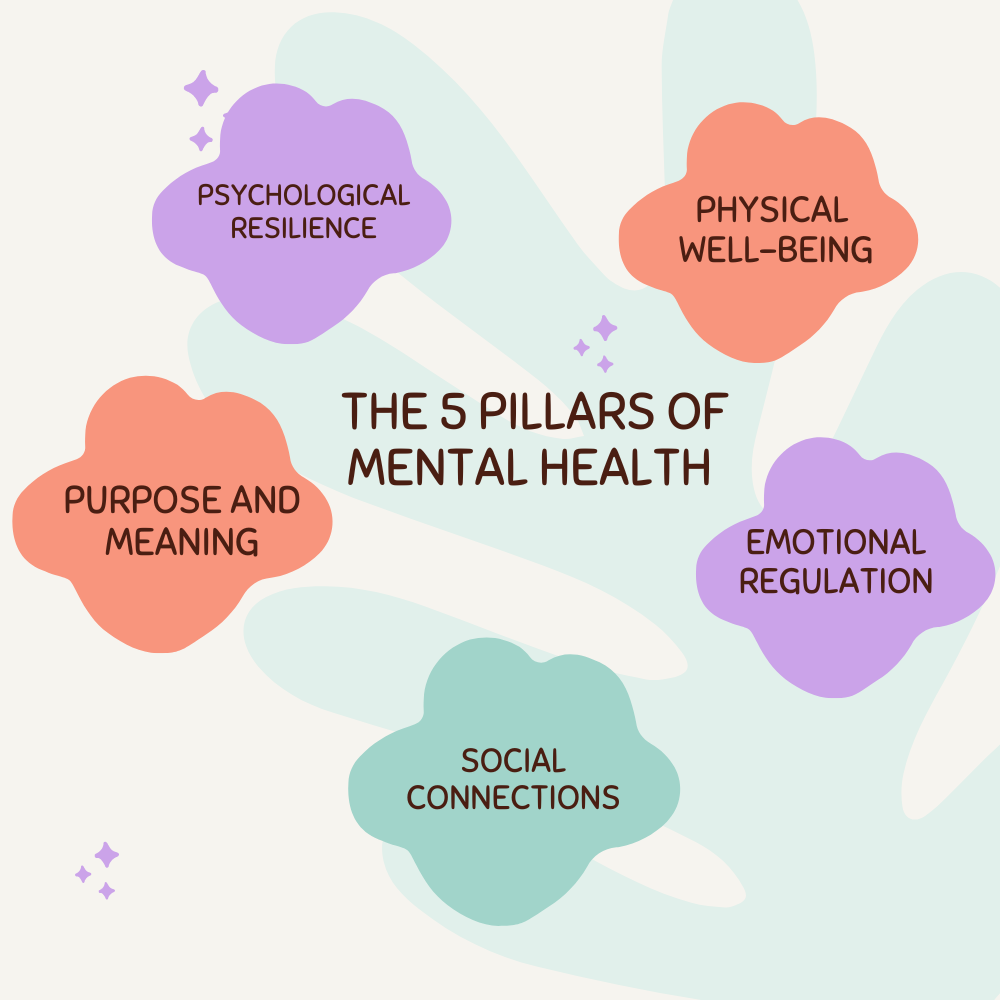
In the introduction, we would provide a thorough definition of mental health, emphasizing its importance in overall well-being. We could discuss the prevalence of mental health issues globally and the impact they have on individuals, families, and society. Highlighting the need for a holistic approach to mental health, we would introduce the concept of the 5 pillars and explain how they contribute to mental well-being.
II. The Foundation: Emotional Health
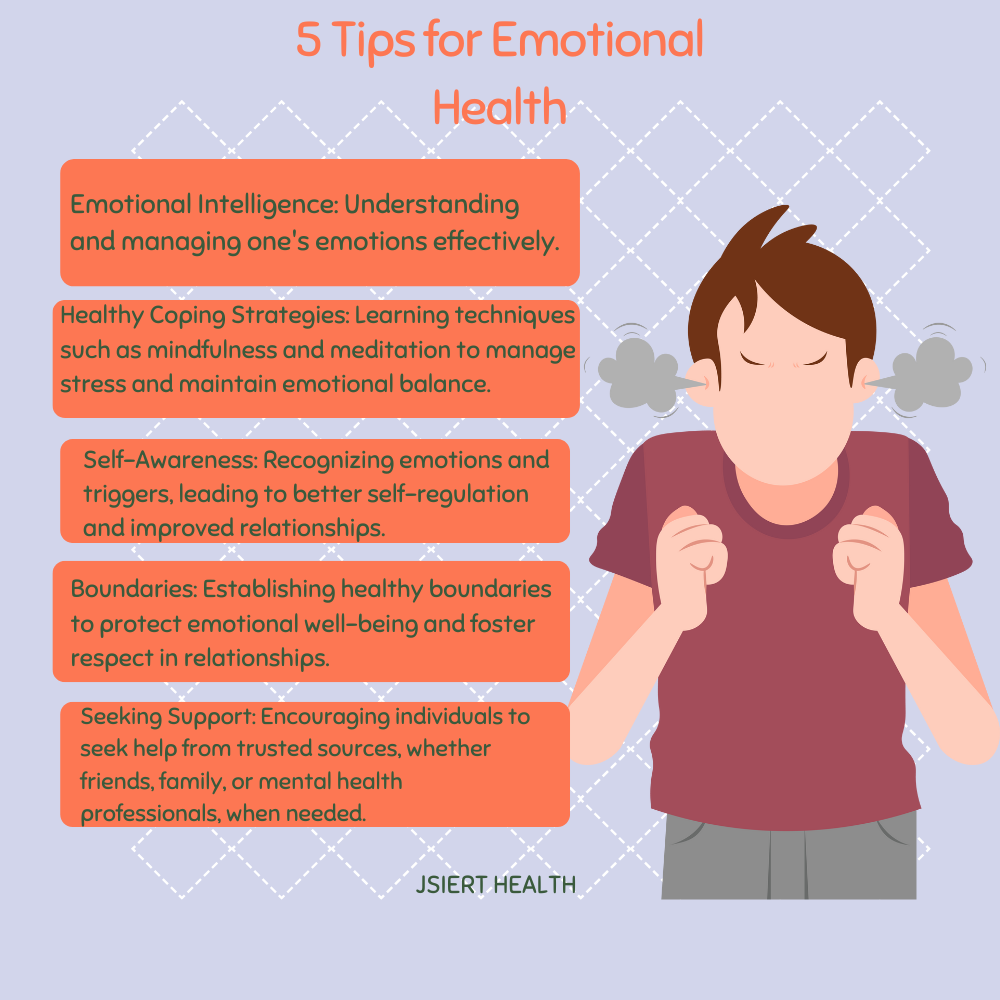
motional health forms the cornerstone of mental well-being, encompassing the ability to recognize, understand, and manage our emotions effectively. It involves being aware of our feelings, expressing them appropriately, and coping with life’s challenges in a healthy manner. Emotional health is vital for building resilience, fostering positive relationships, and achieving overall happiness and satisfaction in life.
Components of Emotional Health:
- Self-Awareness: Understanding one’s emotions, thoughts, and behaviors.
- Emotion Regulation: Managing emotions in a constructive way, avoiding extremes of expression.
- Empathy: Recognizing and understanding the emotions of others, and responding with compassion.
- Stress Management: Coping effectively with stressors and maintaining emotional balance.
- Interpersonal Skills: Communicating effectively, resolving conflicts, and building healthy relationships.
Strategies for Enhancing Emotional Health:
- Mindfulness Practices: Engaging in mindfulness meditation, deep breathing exercises, or yoga to cultivate present-moment awareness and reduce stress.
- Journaling: Writing down thoughts and feelings can help clarify emotions, identify patterns, and gain insight into underlying issues.
- Seeking Support: Talking to trusted friends, family members, or mental health professionals can provide validation, perspective, and emotional support.
- Setting Boundaries: Establishing healthy boundaries in relationships helps protect emotional well-being and fosters self-respect.
- Self-Care: Engaging in activities that bring joy and relaxation, such as hobbies, exercise, or spending time in nature, promotes emotional resilience.
Expert Insights: Leading psychologists and mental health professionals emphasize the importance of emotional health as the foundation of overall well-being. They recommend regular self-reflection, emotional expression, and seeking professional help when needed to maintain emotional balance and resilience. Experts also highlight the interconnectedness of emotional health with other aspects of mental well-being, underscoring its significance in fostering positive outcomes in life.
III. The Pillar of Physical Well-Being
Physical well-being is a crucial component of mental health, encompassing the overall state of one’s physical health and vitality. It involves maintaining a healthy lifestyle through regular exercise, nutritious eating habits, adequate sleep, and proper self-care practices. Physical well-being is essential for promoting mental clarity, emotional stability, and overall quality of life.
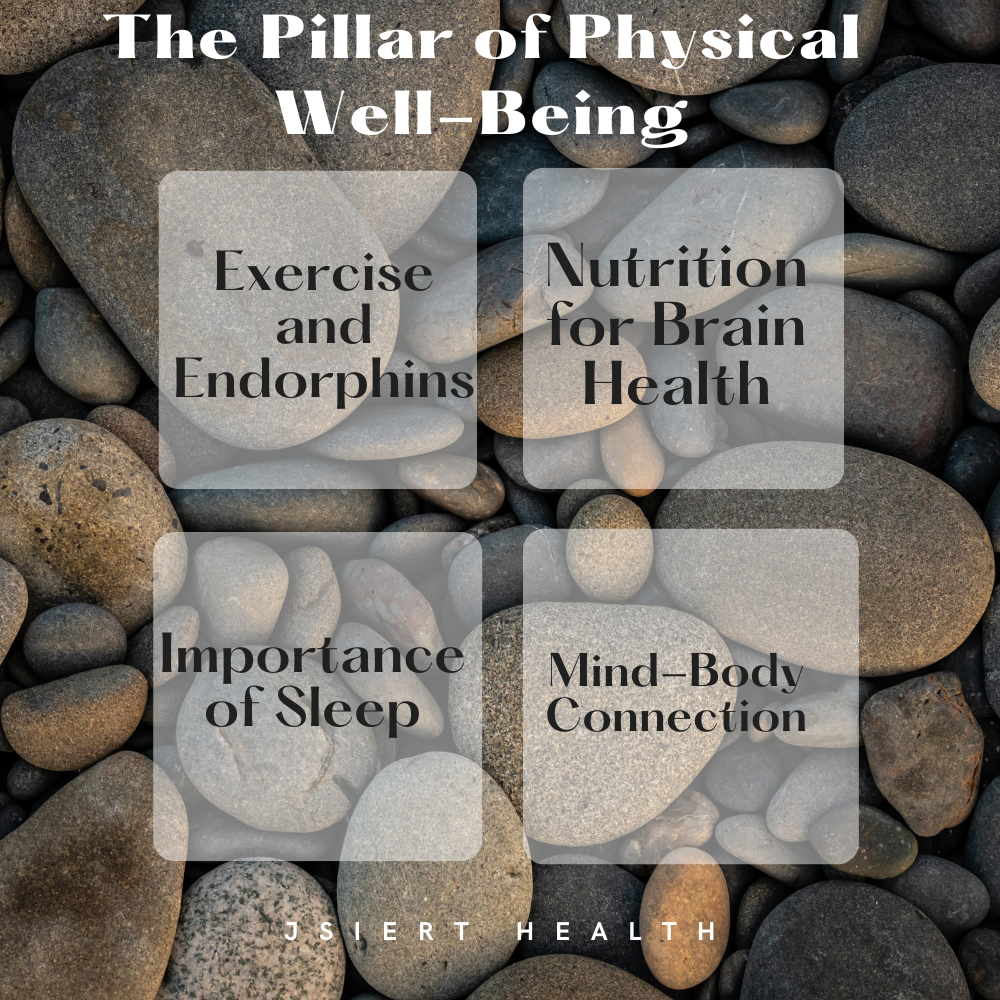
Components of Physical Well-Being:
- Exercise: Engaging in regular physical activity strengthens the body, improves cardiovascular health, and releases endorphins, which are natural mood lifters.
- Nutrition: Consuming a balanced diet rich in fruits, vegetables, lean proteins, and whole grains provides essential nutrients that support brain function and mental well-being.
- Sleep: Getting sufficient, restful sleep is vital for cognitive function, mood regulation, and overall physical and mental health.
- Hydration: Staying hydrated is essential for maintaining proper bodily functions, including brain function, energy levels, and mood stability.
- Self-Care: Practicing self-care activities, such as relaxation techniques, hobbies, and leisure activities, helps reduce stress and promote overall well-being.
Strategies for Enhancing Physical Well-Being:
- Regular Exercise: Incorporating aerobic exercise, strength training, and flexibility exercises into one’s routine promotes physical health and mental well-being.
- Healthy Eating Habits: Choosing nutrient-dense foods and avoiding excessive processed foods, sugars, and unhealthy fats supports optimal physical and mental health.
- Quality Sleep: Establishing a regular sleep schedule, creating a relaxing bedtime routine, and ensuring a comfortable sleep environment promote restful sleep and mental rejuvenation.
- Hydration: Drinking an adequate amount of water throughout the day helps maintain hydration levels, cognitive function, and overall well-being.
- Self-Care Practices: Engaging in activities that promote relaxation, stress reduction, and enjoyment, such as meditation, hobbies, and spending time outdoors, supports physical and mental well-being.
Expert Insights:
Health professionals emphasize the importance of physical well-being as a pillar of mental health. They recommend integrating regular exercise, healthy eating habits, sufficient sleep, hydration, and self-care practices into daily life to support overall well-being. Experts highlight the reciprocal relationship between physical and mental health, emphasizing that taking care of one’s physical health is essential for promoting mental well-being and vice versa.
IV. Nurturing Social Connections
Nurturing social connections involves building and maintaining meaningful relationships with others, including family, friends, colleagues, and community members. These connections play a crucial role in promoting mental health and well-being by providing social support, fostering a sense of belonging, and reducing feelings of loneliness and isolation.
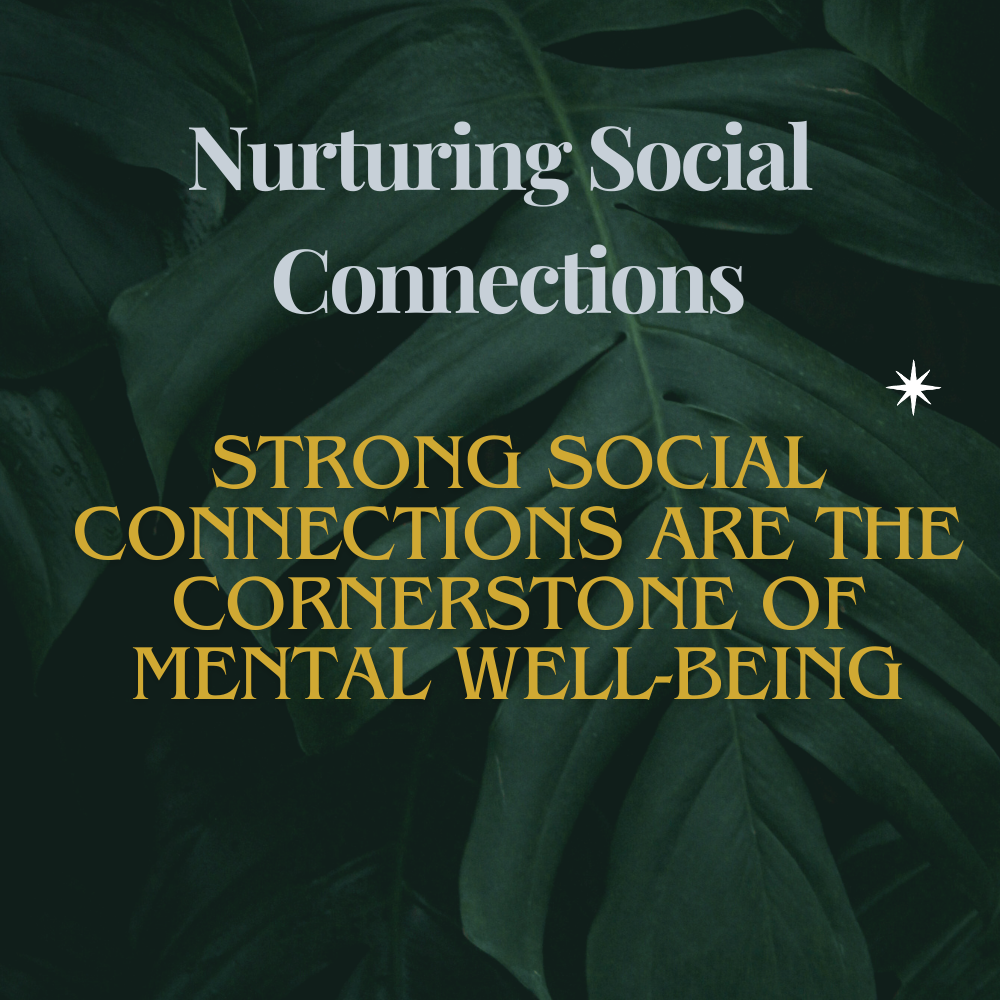
Components of Social Connections:
- Quality Relationships: Having close, supportive relationships characterized by trust, empathy, and mutual respect.
- Communication Skills: Effective communication is essential for building and maintaining healthy relationships, including active listening, expressing empathy, and resolving conflicts constructively.
- Community Engagement: Involvement in social groups, clubs, or community organizations provides opportunities for social interaction, networking, and shared interests.
- Emotional Support: Receiving emotional support from others during times of need helps individuals cope with stress, adversity, and life challenges.
- Social Activities: Participating in social activities, gatherings, or events promotes social connection and fosters a sense of belonging and camaraderie.
Strategies for Nurturing Social Connections:
- Maintain Regular Contact: Make an effort to stay in touch with friends and loved ones through phone calls, text messages, or social media.
- Schedule Social Activities: Plan regular social outings, gatherings, or activities with friends, family, or colleagues to strengthen bonds and create lasting memories.
- Join Social Groups: Participate in clubs, organizations, or hobby groups that align with your interests and values to meet like-minded individuals and expand your social network.
- Practice Active Listening: Be present and attentive when engaging in conversations, and show genuine interest in others’ thoughts, feelings, and experiences.
- Offer Support: Be there for others in times of need, offering a listening ear, words of encouragement, or practical assistance whenever possible.
Expert Insights: Social connection is a fundamental human need that contributes to overall well-being and mental health. Mental health professionals emphasize the importance of nurturing social connections as a pillar of mental health, recommending regular social interaction, meaningful relationships, and community engagement to support emotional resilience and psychological well-being. Experts highlight the positive impact of social support on mental health outcomes, underscoring the importance of building and maintaining strong social connections throughout life.
V. Intellectual Stimulation
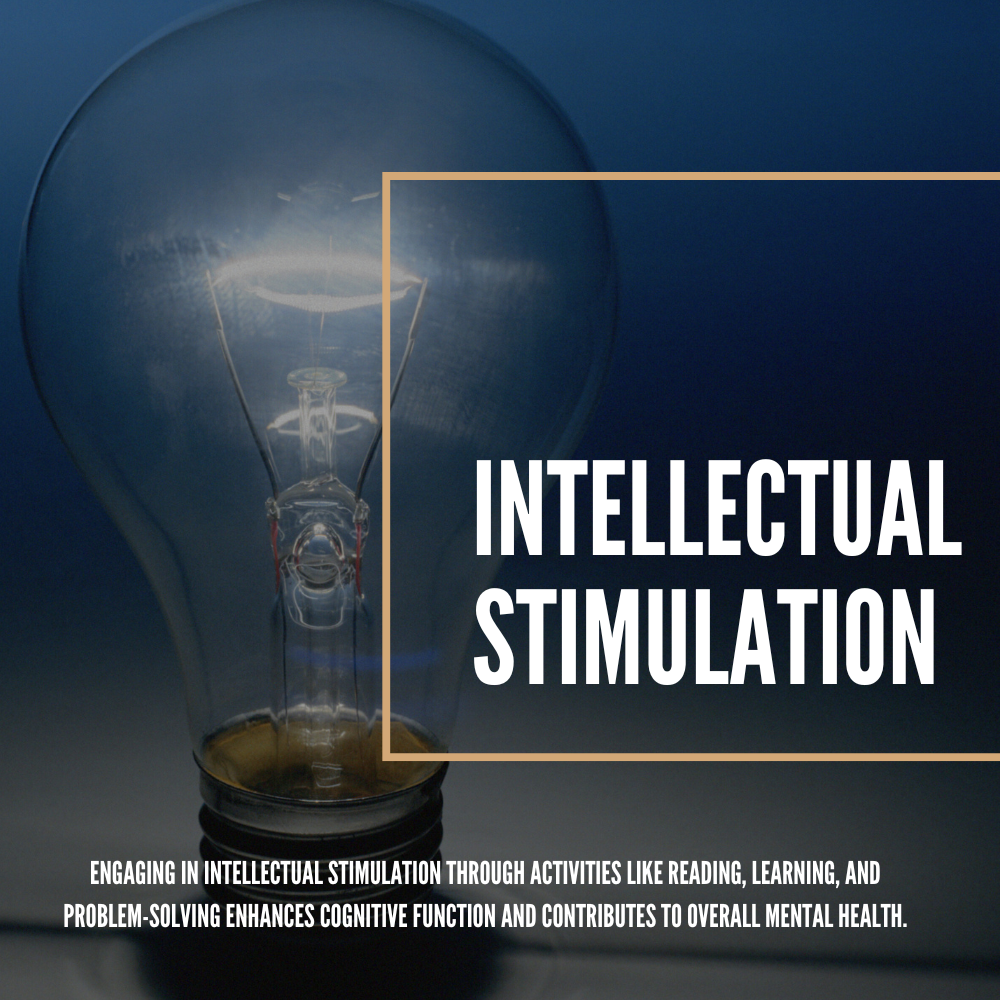
Intellectual stimulation refers to engaging in activities that challenge and stimulate the mind, fostering cognitive growth, creativity, and mental agility. It plays a vital role in maintaining mental sharpness, enhancing problem-solving skills, and promoting overall well-being.
Components of Intellectual Stimulation:
- Lifelong Learning: Embracing a growth mindset and seeking out opportunities for continuous learning and skill development.
- Cognitive Challenges: Engaging in activities that require critical thinking, problem-solving, and mental flexibility.
- Creative Expression: Exploring artistic pursuits, creative hobbies, or innovative projects that encourage self-expression and imagination.
- Intellectual Curiosity: Cultivating a sense of curiosity and wonder about the world, asking questions, and seeking out new experiences.
- Stimulating Environments: Surrounding oneself with intellectually stimulating environments, such as libraries, museums, or cultural events.
Strategies for Intellectual Stimulation:
- Read Widely: Explore a variety of topics and genres through books, articles, and online resources to broaden your knowledge and perspective.
- Learn New Skills: Take up a new hobby, enroll in a class, or pursue online courses to develop new skills and expand your intellectual horizons.
- Problem-Solving Activities: Engage in puzzles, games, or brain teasers that challenge your cognitive abilities and encourage creative problem-solving.
- Creative Pursuits: Explore artistic endeavors such as painting, writing, music, or crafts to express yourself creatively and stimulate your imagination.
- Stay Curious: Stay curious about the world around you, ask questions, and seek out opportunities for exploration and discovery.
Expert Insights: Intellectual stimulation is a key component of mental health and well-being, contributing to cognitive vitality and psychological resilience. Mental health experts emphasize the importance of intellectual engagement as one of the pillars of mental health, highlighting its role in promoting cognitive flexibility, adaptability, and lifelong learning. They recommend incorporating intellectually stimulating activities into daily life as part of a holistic approach to mental well-being.
VI. Finding Meaning and Purpose
Finding meaning and purpose involves identifying values, passions, and goals that provide direction and fulfillment in life. It is a fundamental aspect of mental health, contributing to a sense of fulfillment, resilience, and overall well-being.

Components of Finding Meaning and Purpose:
- Personal Values: Identifying core values and beliefs that guide behavior and decision-making.
- Passions and Interests: Exploring interests, hobbies, and activities that bring joy and fulfillment.
- Goal Setting: Establishing short-term and long-term goals that align with personal values and aspirations.
- Contribution and Service: Engaging in activities that contribute to the well-being of others or serve a greater purpose.
- Spirituality and Connection: Finding meaning through spiritual beliefs, practices, or a sense of connection to something greater than oneself.
Strategies for Finding Meaning and Purpose:
- Self-Reflection: Take time to reflect on personal values, interests, and aspirations to gain clarity about what brings meaning and purpose to your life.
- Exploration: Explore different activities, hobbies, or career paths to discover what resonates with you and brings a sense of fulfillment.
- Goal Setting: Set SMART (Specific, Measurable, Achievable, Relevant, Time-bound) goals that align with your values and passions, and work towards achieving them.
- Service and Contribution: Volunteer your time, skills, or resources to support causes or organizations that align with your values and provide a sense of purpose.
- Spiritual Practices: Engage in spiritual practices, such as meditation, prayer, or mindfulness, to connect with your inner self and explore existential questions about life’s meaning and purpose.
Expert Insights: Finding meaning and purpose is essential for mental health and well-being, providing a sense of direction, motivation, and fulfillment in life. Mental health experts emphasize the importance of finding meaning and purpose as one of the pillars of mental health, highlighting its role in promoting resilience, psychological well-being, and overall life satisfaction. They recommend exploring values, passions, and goals as part of a holistic approach to mental well-being.
VII. Expert Insights on Integrating the 5 Pillars
Incorporating expert insights into the integration of the 5 pillars of mental health provides invaluable guidance for individuals seeking to enhance their overall well-being. Mental health professionals offer nuanced perspectives and evidence-based strategies to effectively integrate each pillar into daily life. Here’s a detailed breakdown:
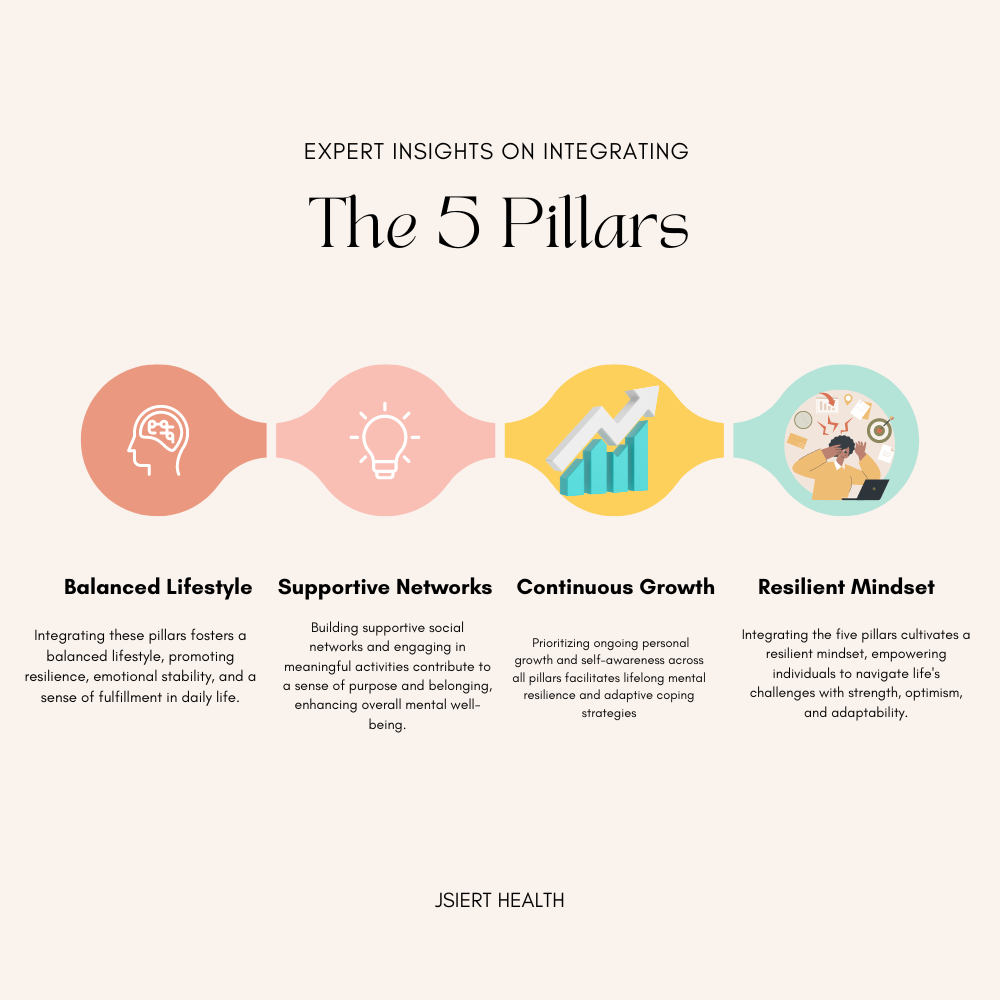
1. Emotional Health:
- Expert Perspective: Mental health experts emphasize the importance of emotional intelligence and self-awareness in managing emotions effectively.
- Strategies: They recommend mindfulness practices, such as meditation and deep breathing exercises, to cultivate emotional resilience and regulation.
- Supportive Techniques: Cognitive-behavioral therapy (CBT) techniques, like cognitive restructuring and emotion regulation skills training, are recommended to address maladaptive emotional patterns.
2. Physical Well-Being:
- Expert Perspective: Health professionals stress the bidirectional relationship between physical and mental health, highlighting the impact of lifestyle choices on overall well-being.
- Strategies: They advocate for regular exercise, balanced nutrition, adequate sleep, and stress management techniques to optimize physical and mental health.
- Behavioral Changes: Health coaches may focus on goal-setting and habit formation to promote sustainable lifestyle changes that support physical and mental well-being.
3. Social Connections:
- Expert Perspective: Mental health experts underscore the significance of social support networks in buffering against stress and promoting resilience.
- Strategies: They encourage fostering meaningful relationships, engaging in community activities, and seeking social support during times of need.
- Therapeutic Approaches: Group therapy or support groups provide opportunities for individuals to connect with others facing similar challenges and receive validation and encouragement.
4. Intellectual Stimulation:
- Expert Perspective: Professionals emphasize the role of cognitive engagement in maintaining mental acuity and promoting cognitive resilience.
- Strategies: They recommend lifelong learning, problem-solving activities, creative pursuits, and exposure to new experiences to stimulate cognitive function.
- Cognitive Therapies: Cognitive enhancement therapies, such as cognitive remediation or brain training programs, may be recommended to address cognitive deficits or enhance cognitive skills.
5. Finding Meaning and Purpose:
- Expert Perspective: Mental health professionals highlight the existential importance of finding meaning and purpose in life for overall well-being.
- Strategies: They suggest self-reflection, exploration of personal values and passions, goal-setting, and engagement in activities that provide a sense of purpose.
- Existential Therapy: Existential therapists may guide individuals in exploring existential concerns and existential givens, such as freedom, isolation, and death, to facilitate the search for meaning.
Integration and Holistic Approach:
- Mental health experts advocate for a holistic approach that integrates all five pillars of mental health, recognizing their interdependence and synergistic effects on overall well-being.
- They emphasize the importance of personalized interventions tailored to individual needs, preferences, and strengths.
- Collaborative efforts between mental health professionals, individuals, and support systems (e.g., family, friends, community) are essential for sustainable change and long-term well-being.
Incorporating expert insights into the integration of the 5 pillars provides individuals with practical guidance and evidence-based strategies to cultivate resilience, enhance overall well-being, and thrive in all aspects of life.
VIII. Overcoming Barriers to Mental Health
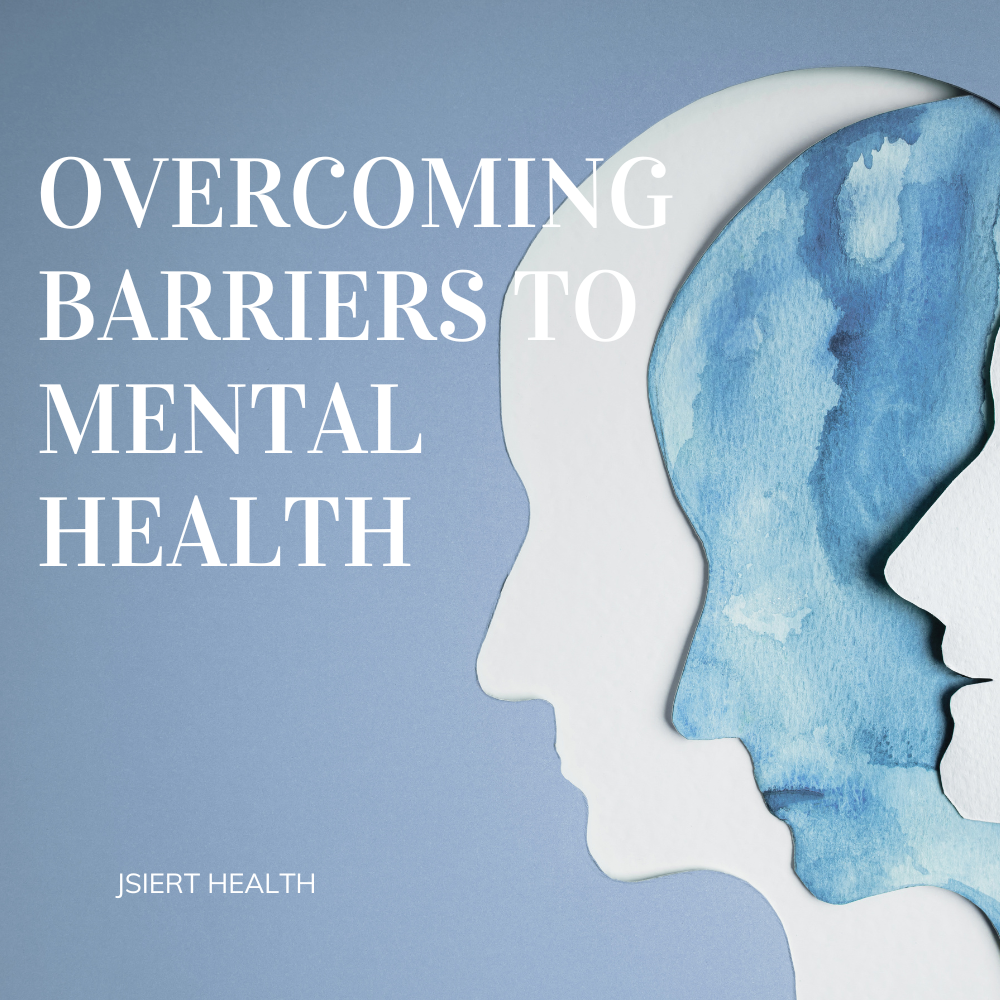
Understanding the Barriers: Identifying and understanding barriers to mental health is crucial for effectively addressing them. These barriers can be multifaceted and may include stigma, lack of access to resources, financial constraints, cultural beliefs, and systemic inequalities.
Expert Insights: Mental health professionals offer valuable insights into overcoming these barriers, drawing from their expertise in psychology, psychiatry, counseling, and social work. They provide nuanced perspectives and evidence-based strategies to empower individuals to overcome obstacles and access the support they need.
1. Stigma and Discrimination:
- Expert Perspective: Mental health experts emphasize the pervasive impact of stigma and discrimination on help-seeking behaviors and treatment outcomes.
- Strategies: They advocate for education, awareness campaigns, and advocacy efforts to challenge stigma and promote acceptance and understanding of mental health conditions.
- Therapeutic Approaches: Cognitive-behavioral therapy (CBT) and psychoeducation interventions may address internalized stigma and negative beliefs about mental illness.
2. Access to Mental Health Services:
- Expert Perspective: Health professionals highlight the disparities in access to mental health care, including geographical barriers, long wait times, and limited insurance coverage.
- Strategies: They recommend expanding mental health services in underserved areas, increasing funding for community-based programs, and integrating mental health care into primary care settings.
- Teletherapy Solutions: Teletherapy and digital mental health platforms offer accessible and convenient options for remote counseling and support.
3. Financial Constraints:
- Expert Perspective: Mental health experts recognize the financial barriers that prevent individuals from accessing mental health care, including high treatment costs and lack of insurance coverage.
- Strategies: They advocate for policies that improve insurance coverage for mental health services, increase funding for low-cost or sliding-scale clinics, and provide financial assistance programs for those in need.
- Community Support: Nonprofit organizations and community-based initiatives may offer free or low-cost counseling services, support groups, and resources for individuals with limited financial resources.
4. Cultural and Linguistic Barriers:
- Expert Perspective: Mental health professionals acknowledge the cultural diversity of individuals seeking mental health support and the importance of culturally sensitive care.
- Strategies: They emphasize the need for culturally competent mental health services, including bilingual staff, culturally adapted interventions, and outreach programs targeting diverse communities.
- Cultural Competence Training: Training programs for mental health providers can enhance cultural competence and awareness of cultural norms, beliefs, and values.
5. Systemic Inequalities and Social Determinants of Health:
- Expert Perspective: Mental health experts recognize the impact of systemic inequalities, such as poverty, racism, sexism, and discrimination, on mental health outcomes.
- Strategies: They advocate for social justice initiatives, policy changes, and community-based interventions that address the root causes of inequities and promote mental health equity.
- Intersectional Approaches: Intersectional frameworks that consider the intersecting identities and experiences of individuals can inform interventions that address multiple layers of oppression and marginalization.
Collaborative Solutions:
- Mental health professionals emphasize the importance of collaborative efforts between individuals, communities, policymakers, and health care providers to overcome barriers to mental health.
- They advocate for participatory approaches that involve stakeholders in decision-making processes, prioritize the voices of marginalized communities, and promote equitable access to mental health care for all.
By incorporating expert insights and evidence-based strategies, individuals and communities can work together to dismantle barriers to mental health, promote access to care, and create supportive environments where everyone can thrive.
IX. The Future of Mental Health
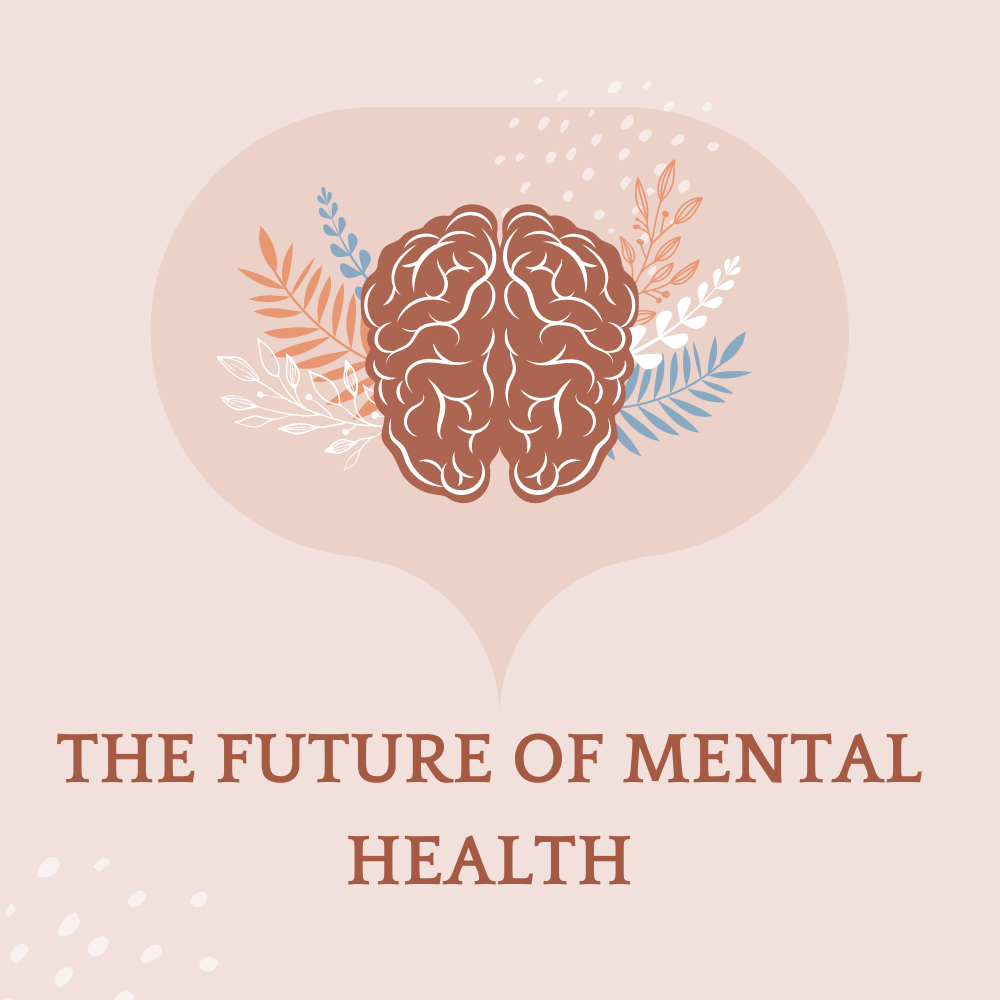
The Future of Mental Health: Anticipated Trends and Innovations
1. Digital Mental Health Solutions:
- Expert Perspective: Mental health experts foresee a continued shift towards digital mental health platforms, including teletherapy, mobile apps, and online support communities.
- Details: These platforms offer increased accessibility, convenience, and anonymity, catering to diverse populations and reducing barriers to care. Advances in artificial intelligence (AI) may also facilitate personalized interventions and remote monitoring of mental health.
2. Integrated Care Models:
- Expert Perspective: There is growing recognition of the importance of integrating mental health care into primary care settings and other healthcare services.
- Details: Integrated care models aim to provide holistic support by addressing physical, mental, and social needs concurrently. This approach enhances collaboration between healthcare providers, improves care coordination, and reduces fragmentation in the healthcare system.
3. Precision Psychiatry and Personalized Treatments:
- Expert Perspective: The future of mental health care may involve precision psychiatry approaches, leveraging genetic, neurobiological, and psychosocial factors to tailor treatment plans.
- Details: Advancements in biomarker research, neuroimaging technology, and predictive analytics may enable clinicians to identify individualized treatment strategies that optimize outcomes and minimize side effects.
4. Virtual Reality Therapy:
- Expert Perspective: Virtual reality (VR) therapy holds promise as a therapeutic modality for treating various mental health conditions, including phobias, PTSD, and anxiety disorders.
- Details: VR technology immerses individuals in simulated environments that replicate real-life scenarios, providing exposure therapy in a controlled and customizable manner. This approach enhances engagement, desensitization, and therapeutic outcomes.
5. Culturally Tailored Interventions:
- Expert Perspective: Mental health professionals emphasize the importance of culturally competent and inclusive care that addresses the unique needs and experiences of diverse populations.
- Details: Culturally tailored interventions incorporate cultural values, beliefs, and practices into treatment approaches, fostering trust, engagement, and relevance for individuals from marginalized or underrepresented communities.
6. Prevention and Early Intervention:
- Expert Perspective: There is growing recognition of the importance of prevention and early intervention strategies in mitigating mental health challenges before they escalate.
- Details: Public health initiatives, school-based programs, and community interventions aim to promote mental wellness, build resilience, and provide timely support to individuals at risk of developing mental health disorders.
7. Peer Support and Peer-Led Interventions:
- Expert Perspective: Peer support programs and peer-led interventions are gaining traction as effective strategies for promoting recovery and empowering individuals with lived experience.
- Details: Peer support networks offer mutual understanding, empathy, and validation, fostering a sense of belonging and reducing feelings of isolation. Peer specialists provide guidance, role modeling, and practical assistance in navigating the mental health system.
8. Ethical Considerations and Digital Ethics:
- Expert Perspective: Mental health professionals stress the importance of ethical guidelines and regulations to ensure the responsible use of emerging technologies in mental health care.
- Details: Digital ethics frameworks address issues such as privacy, data security, informed consent, and algorithmic bias, safeguarding individuals’ rights and well-being in the digital age.
Conclusion: The future of mental health is characterized by innovation, collaboration, and a commitment to promoting holistic well-being for all individuals. By embracing technological advancements, integrating care models, personalizing treatments, and prioritizing prevention and equity, mental health care will continue to evolve to meet the diverse needs of individuals and communities worldwide.
X. Conclusion
In concluding the guide, we can reiterate key takeaways and offer a message of hope and resilience. Additional resources, such as books, websites, or apps, can be recommended for further exploration of mental health topics.
REFERENCES:
To gain a comprehensive understanding of the five pillars of mental health, you can explore various reputable sources, including:
- Academic Journals and Research Papers:
- Psychological Bulletin
- Journal of Abnormal Psychology
- Journal of Consulting and Clinical Psychology
- Books:
- “The Mental Health Handbook: A Cognitive Behavioral Approach” by Trevor Powell and Ray Woolfe.
- “The Body Keeps the Score: Brain, Mind, and Body in the Healing of Trauma” by Bessel van der Kolk.
- “The Mindful Way Through Depression: Freeing Yourself from Chronic Unhappiness” by Mark Williams, John Teasdale, Zindel Segal, and Jon Kabat-Zinn.
- Websites and Professional Organizations:
- American Psychological Association (APA) – https://www.apa.org/
- National Alliance on Mental Illness (NAMI) – https://www.nami.org/
- Mental Health America (MHA) – https://www.mhanational.org/
- Online Courses and Webinars:
- Coursera offers courses on mental health topics, such as “The Science of Well-Being” by Yale University.
- Udemy offers courses on mindfulness, stress management, and mental health awareness.
- Podcasts and Interviews:
- The Mental Illness Happy Hour podcast with Paul Gilmartin often delves into various aspects of mental health with expert guests.
- The TED Talks series features numerous talks by mental health professionals discussing topics related to mental well-being and the pillars of mental health.
- Peer-Reviewed Articles and White Papers:
- Explore databases like PubMed, PsycINFO, and Google Scholar for scholarly articles on mental health pillars.
By consulting these resources, you can gain expert insights into the five pillars of mental health: emotional well-being, physical health, social connections, financial stability, and a sense of purpose. These sources offer a wealth of information to help you understand, support, and maintain mental well-being.
Frequently Asked Questions (FAQ): Understanding the 5 Pillars of Mental Health
Q1.What are the 5 Pillars of Mental Health?
ANS : The 5 Pillars of Mental Health are five key areas of focus that contribute to overall well-being and psychological resilience. They include emotional well-being, physical health, social connections, spiritual fulfillment, and intellectual stimulation.
Q.2.Why are the 5 Pillars important for mental health?
ANS : Each of the 5 Pillars plays a crucial role in maintaining balance and promoting mental wellness. Neglecting any one of these pillars can lead to issues such as stress, anxiety, depression, and overall decreased quality of life.
Q.3. How can I improve my emotional well-being?
ANS : Emotional well-being involves recognizing and managing your emotions in a healthy way. Practices such as mindfulness, journaling, therapy, and self-care activities like exercise and hobbies can all contribute to improved emotional health.
Q.4. What role does physical health play in mental well-being?
ANS: Physical health and mental health are closely linked. Regular exercise, nutritious eating habits, adequate sleep, and avoiding harmful substances like drugs and alcohol can significantly impact mood and overall mental well-being.
Q.5.How do social connections affect mental health?
ANS: Social connections provide emotional support, a sense of belonging, and opportunities for positive interactions. Building and maintaining relationships with friends, family, and community members can help combat feelings of loneliness and isolation.
Q.6. What does spiritual fulfillment entail?
ANS : Spiritual fulfillment involves finding meaning, purpose, and connection to something greater than oneself. This can be achieved through practices such as meditation, prayer, spending time in nature, or engaging in activities that align with your personal values and beliefs.
Q.7. How can I stimulate myself intellectually for better mental health?
ANS : Intellectual stimulation involves challenging your mind and continuously learning new things. This can be accomplished through activities like reading, puzzles, creative pursuits, pursuing educational opportunities, and engaging in stimulating conversations with others.
Q.8. Can focusing on these pillars prevent mental health problems?
ANS : While focusing on the 5 Pillars of Mental Health can certainly reduce the risk of developing mental health issues, it’s important to recognize that mental health is complex and influenced by various factors. However, incorporating practices that support each pillar into your daily life can contribute to overall resilience and well-being.
Q.9. What are some practical tips for incorporating the 5 Pillars into my daily routine?
ANS : Start by setting small, achievable goals in each pillar. For example, you might commit to taking a short walk for physical health, reaching out to a friend for social connection, or spending a few minutes in quiet reflection for spiritual fulfillment. Over time, these habits can become an integral part of your daily routine.
Q.10. When should I seek professional help for mental health concerns?
ANS : If you’re experiencing persistent or severe symptoms of mental distress, such as prolonged sadness, anxiety, or difficulty functioning in daily life, it’s important to seek help from a qualified mental health professional. They can provide assessment, support, and appropriate treatment options tailored to your individual needs.